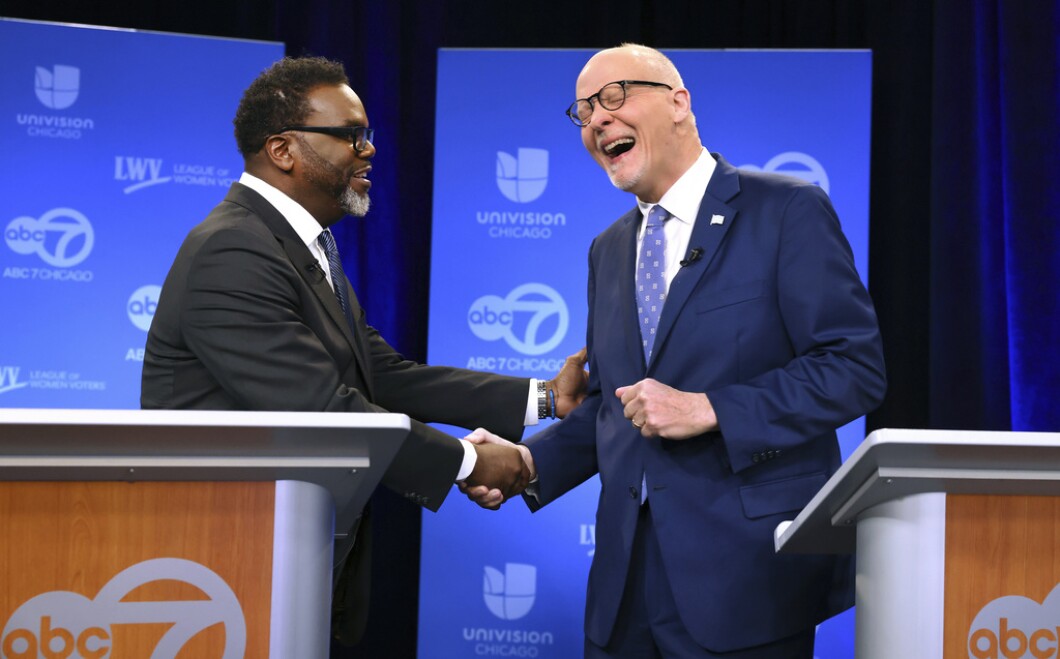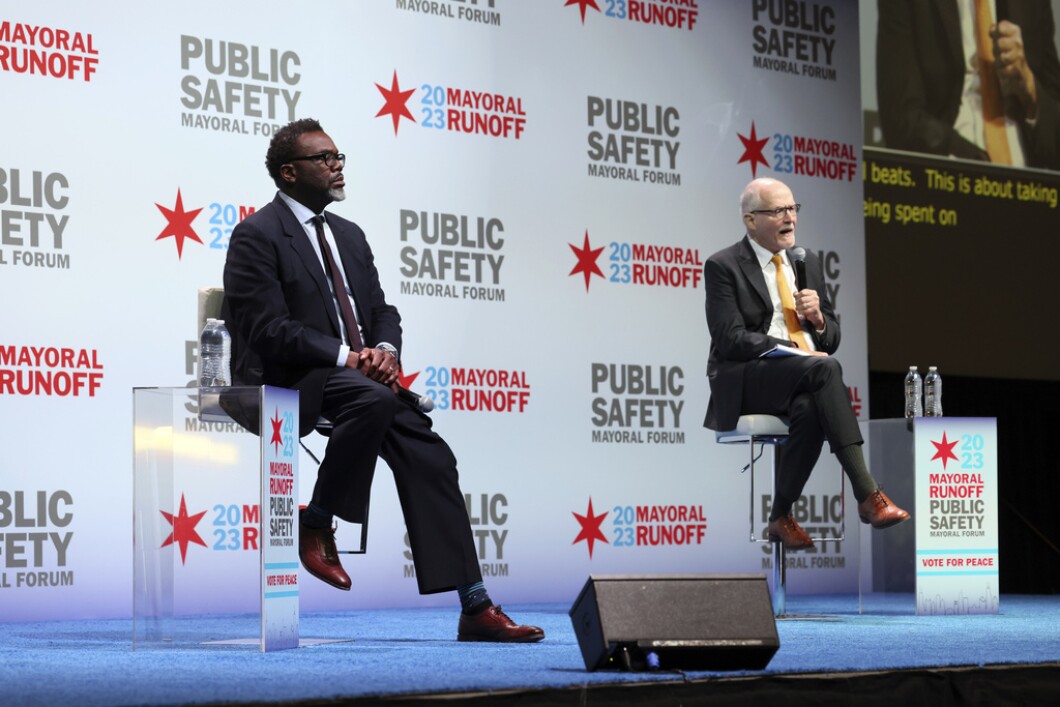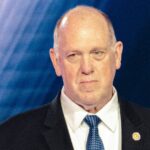
Chicago mayoral candidates Paul Vallas and Brandon Johnson have spent the remaining days of their campaigns taking aim at each others’ resumes and leadership capabilities as the city prepares for a runoff election next week.
Vallas and Johnson, each with their own connections within the education sphere and opinions on how to deal with the criminal justice system, will face each other in the April 4 runoff election after ousting Mayor Lori Lightfoot in the general election.
CHICAGO MAYORAL RACE: RUNOFF CANDIDATES OFFER TWO PERSPECTIVES ON EDUCATION
While Vallas insists that “we’re really friends, believe it or not,” both men have not been afraid to attack each others’ ideological beliefs, past comments, and prior experiences in efforts to sway voters to their side.
The candidates participated in their last televised debate on March 28, focusing heavily on their political records and associations with several unions and organizations that have endorsed them.

Last-ditch efforts for crime and education
Crime, which a recent WGN Poll found that 52% of Chicago voters rank as their top issue, has been a main discussion topic since the start of the campaigns.
Vallas’s plan, if elected mayor, is to recall officers that resigned from their positions on the police force under Lightfoot’s administration.
“There are, in fact, 300 officers right now who have indicated a willingness to come back. Those are people coming back from retirement. We know for a fact that there are well over 100 officers who have transferred to other departments [that would come back],” he said.
However, he has been heavily criticized for his connection to the Fraternal Order of Police, particularly its president, John Catanzara, due to comments Catanzara made relating the pandemic to the Holocaust and for inviting Gov. Ron DeSantis (R-FL) to speak with officers.
“The fact of the matter is it actually speaks to the type of candidacy that my opponent is running as someone who is supported by the extreme right-wing and has caused tremendous turmoil and divisiveness,” Johnson said. “The truth of the matter is my campaign is surrounded by a multicultural, multigenerational movement.”
Catanzara drew severe scrutiny for an interview he did with the New York Times in which he said if Johnson is elected mayor, there will be mass resignations and “blood in the streets.”
“If this guy gets in, we’re going to see an exodus like we’ve never seen before,” he said of Johnson.
On the other side, Johnson has consistently gone on the defense to make up for comments he made calling the “defund the police” movement “not just admirable, but necessary.” It is a hot-button issue that Johnson’s opponents and critics gleefully jumped on to use as ammunition against him. He never admitted that he said those words until the debate last week.
He continued to circumvent the question regarding his comments, stating, “I’m not going to defund the police.” He added his past comments do not clash with his vow not to reduce Chicago’s police budget.
“They’re not differing positions,” Johnson said, adding that he plans on promoting 200 detectives to solve crimes and hire more officers. “I never said we’re going to take money away from the police. … I’ve never said I was going to cut the police budget.”
The topic of education typically turns into a heated exchange between Vallas and Johnson as they argue over who has the stronger educational background. Vallas, who served as the CEO of Chicago Public Schools, has been scrutinized for his handling of low-performing students and his budget management at schools in Philadelphia and New Orleans. Johnson was a longtime Chicago Teachers Union organizer and teacher at the Jenner Academy of the Arts.
Recently, Johnson has branded Vallas’s comments on his four-year teaching gig as a dismissal of a black man’s background and claimed Vallas was insinuating that he was over-inflating his former career.
“The fact that he’s being dismissive of a black man who taught for four years in Chicago Public Schools is, is — you got to stop doing that, Paul, you just do,” Johnson said last week.
However, Vallas has denied that he is attacking Johnson’s short tenure.
“I’m criticizing his leadership ability and his lack of management competency,” Vallas said. “That’s what I’m questioning. Not his four years as a teacher.”

CHICAGO MAYORAL RACE: ENDORSEMENTS LINING UP FOR VALLAS AND JOHNSON AHEAD OF RUNOFF
Where endorsements stand
Several unions, organizations, former mayoral candidates, and national figures have thrown their lot behind one of the two candidates, pushing for Johnson, a more progressive option, or Vallas, a centrist figure.
Vallas’s major support comes from the Fraternal Order of Police and several pro-police city council members. He also has the majority of former mayoral candidates backing him, including Sophia King, Ja’Mal Green, Willie Wilson, and Alderman Rod Sawyer.
He recently gained an endorsement from Sen. Dick Durbin (D-IL), who said he is a “thoughtful leader who can strengthen Chicago’s economy and create jobs” and create “safer neighborhoods.”
Johnson received an endorsement from the Chicago Teachers Union, giving him a huge boost among voters worried about the state of Chicago’s school system. He also received support from national figures such as Reps. Jim Clyburn (D-SC), Delia Ramirez (D-IL), and Jonathan Jackson (D-IL), as well as Sens. Elizabeth Warren (D-MA) and Bernie Sanders (I-VT).
However, this does not necessarily mean someone’s supporters will also vote for their endorsed candidates. Former mayoral candidate and U.S. Rep. Jesus “Chuy’ Garcia (D-IL) endorsed Johnson — however, a recent poll determined that 35.5% of Garcia’s general election supporters would vote for Vallas instead. Similarly, 64% of Green’s supporters would vote for Johnson.
Lightfoot has yet to endorse a candidate, stating in her concession speech that she had congratulated both of them and would support either of them. In the poll, 57.1% of Lightfoot’s supporters would choose Johnson, and 24.4% would vote for Vallas.
Poll standings
As of a March 23-25 poll, Vallas is leading Johnson, 46% to 41%. Adding in undecided voters, his lead increased to 53%-47%.
Johnson needs a surge of young voters before the runoff election on April 4, as only 18% of early voting ballots cast by Chicagoans aged 18-34 have been for Johnson so far. However, he is ahead of Vallas in voters 49 and younger overall, pulling 58.2% in support from voters aged 18-34 and 45.7% from voters aged 35-49.
Vallas maintains a strong hold on Chicago’s older demographic and Latino population. Voters aged 65 and older are throwing their support behind Vallas at 50.6% and 53.4% for those aged 50-64.
CLICK HERE TO READ MORE FROM THE WASHINGTON EXAMINER
Following similar trends, 70% of voters say Chicago is headed in the wrong direction, shedding a light on Lightfoot’s tenure as mayor since 2019, which was heavily bombarded by critics for rising crime and a declining economy that took hits from the pandemic. When asked about the city’s crime rate, 61% of voters said there was more crime in Chicago now than there was a year ago.
Overall, Vallas is more trusted to solve the city’s issues than Johnson. Regarding crime, 54% of voters trust Vallas, and 38% trust Johnson. In education, 48% choose Vallas, and 41% choose Johnson. Finally, in finance, 50% believe Vallas has a better grasp on the situation, compared to 37% who pick Johnson.





